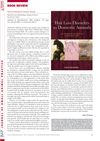 8 citations,
January 2017 in “Elsevier eBooks”
8 citations,
January 2017 in “Elsevier eBooks” Certain nutrients can help keep skin healthy as we age.
 8 citations,
May 1982 in “Journal of Endocrinology/Journal of endocrinology”
8 citations,
May 1982 in “Journal of Endocrinology/Journal of endocrinology” Rat skin takes up and processes testosterone differently than other organs, with testosterone being more important for the skin than its metabolite 5α-DHT.
 7 citations,
February 2016 in “Dermatology and therapy”
7 citations,
February 2016 in “Dermatology and therapy” t-Flavanone helps improve male pattern hair loss by making hair roots stronger.
 7 citations,
November 2013 in “Pediatrics in Review”
7 citations,
November 2013 in “Pediatrics in Review” Acne is a chronic skin condition not caused by poor hygiene or diet, and it requires long-term treatment and patient education.
 7 citations,
March 2011 in “Expert Opinion on Drug Safety”
7 citations,
March 2011 in “Expert Opinion on Drug Safety” Exemestane is effective and safe for treating certain breast cancers, with mild side effects, but needs more research on long-term effects.
 7 citations,
February 2021 in “Dermatologic Therapy”
7 citations,
February 2021 in “Dermatologic Therapy” Sebaceous glands are involved in various skin disorders, some treatable with medications like finasteride and minoxidil.
 7 citations,
October 2020 in “Journal of Clinical Medicine”
7 citations,
October 2020 in “Journal of Clinical Medicine” Women with PCOS are at high risk of glucose metabolism issues and heart diseases, especially if overweight, highlighting the need for early intervention.
 7 citations,
January 2016 in “Clinical Hemorheology and Microcirculation”
7 citations,
January 2016 in “Clinical Hemorheology and Microcirculation” AGA patients have higher heart disease risk.
 6 citations,
December 2010 in “Journal of Cosmetic Dermatology”
6 citations,
December 2010 in “Journal of Cosmetic Dermatology” Apoptosis may contribute to hair loss in androgenetic alopecia.
 6 citations,
January 2010 in “Springer eBooks”
6 citations,
January 2010 in “Springer eBooks” SA linked to mitochondrial issues and oxidative stress, while AGA involves disrupted hair growth genes.
 5 citations,
October 2018 in “Sains Malaysiana”
5 citations,
October 2018 in “Sains Malaysiana” Testosterone reduces key molecules needed for early pregnancy in rats.
 5 citations,
May 2017 in “Journal of the European Academy of Dermatology and Venereology”
5 citations,
May 2017 in “Journal of the European Academy of Dermatology and Venereology” The study found no significant difference in stress hormone levels between people with alopecia areata and healthy individuals, suggesting that the disease is not caused by an overactive stress response system.
 4 citations,
January 2012 in “Journal of the Egyptian Women's Dermatologic Society (Print)”
4 citations,
January 2012 in “Journal of the Egyptian Women's Dermatologic Society (Print)” Women with female pattern hair loss may have a higher risk of developing metabolic syndrome.
 4 citations,
June 2021 in “Powder Technology”
4 citations,
June 2021 in “Powder Technology” Granules improve hair loss treatment by targeting follicles.
 2 citations,
August 2020 in “International Journal of Cosmetic Science”
2 citations,
August 2020 in “International Journal of Cosmetic Science” Lindera strychnifolia root extract may help balance scalp bacteria and potentially reduce hair loss.
 2 citations,
January 2014 in “Hair therapy & transplantation”
2 citations,
January 2014 in “Hair therapy & transplantation” New treatments for hair growth disorders are needed due to limited current options and complex hair follicle biology.
 2 citations,
December 2023 in “Royal Society of Chemistry eBooks”
2 citations,
December 2023 in “Royal Society of Chemistry eBooks” Hair is a complex organ, and understanding its detailed structure and growth phases is crucial for analyzing substances within it.
 1 citations,
January 2020 in “Elsevier eBooks”
1 citations,
January 2020 in “Elsevier eBooks” Hormone therapy is safe and effective for transgender adults, but requires regular monitoring and mental health support.
1 citations,
January 2018 in “Annals of Medical and Health Sciences Research” People with male pattern baldness are more likely to have metabolic syndrome.
 1 citations,
August 2013 in “Springer eBooks”
1 citations,
August 2013 in “Springer eBooks” Birth control pills and anti-androgen medications help manage hair growth, acne, and hair loss in women with PCOS.
 1 citations,
February 2012 in “The American Journal of Cosmetic Surgery”
1 citations,
February 2012 in “The American Journal of Cosmetic Surgery” UBM helps hair regrowth in men and women with hair loss.
 1 citations,
December 2006 in “Annals of the New York Academy of Sciences”
1 citations,
December 2006 in “Annals of the New York Academy of Sciences” Green algae can break down finasteride, reducing environmental harm.
 1 citations,
January 2006
1 citations,
January 2006 Hirsutism is mainly caused by high androgen levels or sensitivity, with PCOS being the most common cause.
 1 citations,
December 2010 in “The journal of small animal practice/Journal of small animal practice”
1 citations,
December 2010 in “The journal of small animal practice/Journal of small animal practice” The book helps veterinarians understand and treat hair loss in animals.
 March 2024 in “Romanian Medical Journal”
March 2024 in “Romanian Medical Journal” Inositol shows promise in treating PCOS and other health issues, but more research is needed.
 March 2024 in “Biomedical reports”
March 2024 in “Biomedical reports” Isoflavone may help manage PCOS symptoms, but its effectiveness is uncertain.
 February 2024 in “International journal of medical science and clinical research studies”
February 2024 in “International journal of medical science and clinical research studies” CCCA is a scarring hair disorder mainly affecting people of African descent, needing better awareness and treatment.
 January 2024 in “Diabetes & metabolism journal”
January 2024 in “Diabetes & metabolism journal” Disrupting natural body clocks increases the risk of developing type 2 diabetes.
 December 2023 in “Research in pharmacy”
December 2023 in “Research in pharmacy” Phytotherapeutic compounds and supplements can help manage Polycystic Ovarian Syndrome (PCOS).
 January 2019 in “Springer eBooks”
January 2019 in “Springer eBooks” Acne is linked to inflammation and insulin resistance, and is associated with various syndromes that require different treatments.





























